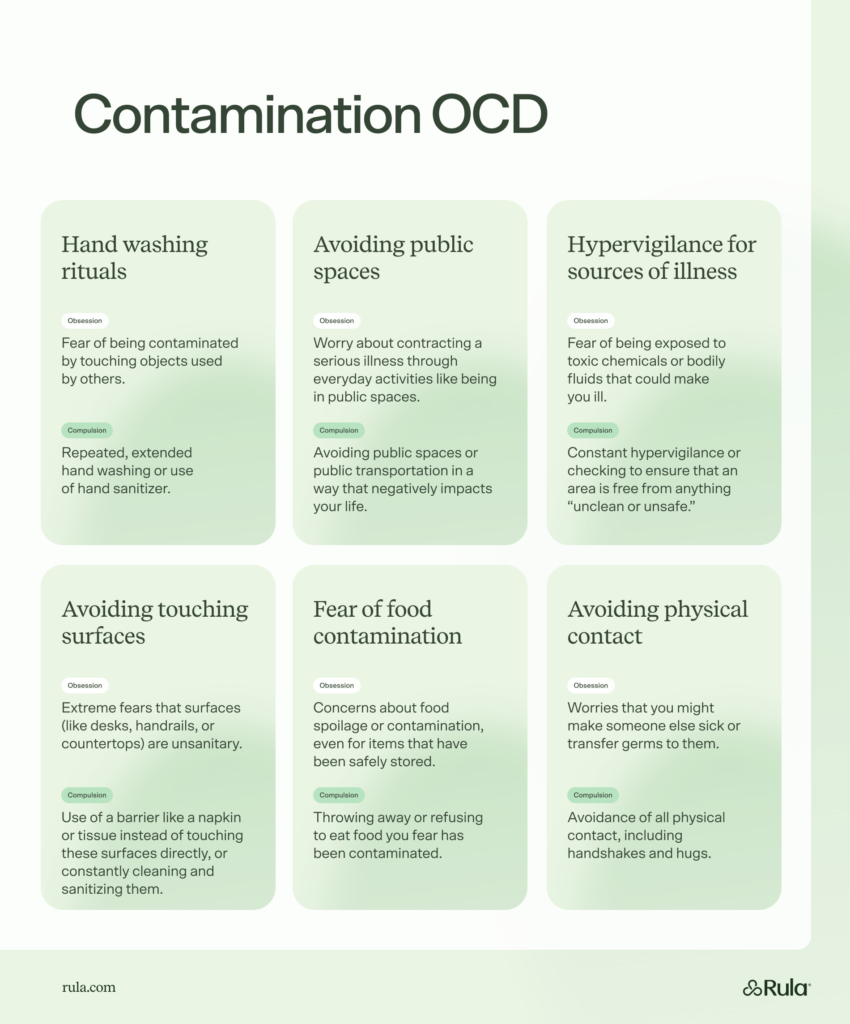Contamination OCD is a subtype of OCD. People who experience contamination OCD have deep-seated fears about exposure to germs, substances, objects, and even people they believe could make them sick.
While not everyone who has OCD experiences contamination anxiety, this form of OCD is among the most common.
Contamination OCD is a serious mental health condition that can make everyday tasks challenging. Fortunately, effective treatment is available.
You’ve probably heard someone with a penchant for home organization or cleanliness say something like “I’m so OCD!” But while many mental health terms have made their way into everyday conversation, obsessive-compulsive disorder (OCD) isn’t an adjective or a personality quirk. OCD is a clinically diagnosed mental health condition that can be incredibly difficult to live with and typically requires professional help to overcome.
OCD causes repeated, distressing, and unwanted thoughts. These intrusive thoughts prompt ritualistic behaviors called compulsions that are intended to resolve discomfort.
There are several different types of OCD and contamination OCD is one of the most common. This condition causes affected people to constantly fear exposure to germs, bacteria, substances, and even people that could make them fatally ill.
Left untreated, these fears can have a deep impact on a person’s life. Fortunately, with the right support, people living with contamination OCD can learn to manage their condition.
What are the symptoms of contamination OCD?
Everyone affected by contamination OCD will have their own unique experience with the condition. But many people who have contamination OCD experience some version of the following symptoms.
Fear of contracting or spreading illness
Constant worry that coming into contact with a certain substance, person, or object will result in serious illness.
Worry about becoming fatally ill from an illness like AIDS or cancer after coming into contact with an object that someone with one of those conditions touched.
Constantly scanning surroundings for signs of something that could result in sickness (for example, a stain on the sidewalk).
Fear about transmitting a disease to others, even without actual evidence of exposure.
Excessive concerns around sanitation
Worry about contamination from being in the presence of a certain substance, person, or object (even without direct contact).
Avoiding people, places, or objects believed to be unsanitary.
Worry about accidental poisoning from toxins like household chemicals.
Performing elaborate sanitation rituals like repeated or excessive hand washing or immediately changing clothes after coming into contact with a perceived source of contamination.
The care you need, when you need it
Learn how Rula can support your mental health journey
What causes contamination OCD?
More research is needed to better understand the causes of contamination OCD. But there are some known factors that might make you more likely to develop the condition:
Genetic factors like having a first-degree relative (like a sibling or parent) who also lives with contamination OCD or other forms of OCD.
Neurobiological abnormalities caused by structural and functional changes to certain neural pathways and other areas of the brain.
Environmental triggers like navigating a major life transition or living in a high-stress environment, especially if you have other factors that already put you at risk.
Personal experiences of trauma are known to cause a mental health condition called post-traumatic stress disorder (PTSD). Research shows that people who live with PTSD are also at increased risk of developing OCD.

Daily challenges of living with contamination OCD
People living with contamination OCD live with fear that they’ll be exposed to life-threatening illnesses like AIDS or cancer. They worry that touching an object that someone else touched (like a doorknob or elevator button) will result in the transfer of a virus or bacteria that could make them seriously sick.
This can make moving through the world and attending to life’s responsibilities very difficult. While contamination OCD affects different people in different ways, some of the more common obsessions and resulting compulsive behaviors associated with the condition include:
Hand washing rituals
Obsession: Fear of being contaminated by touching objects used by others.
Compulsion: Repeated, extended hand washing or use of hand sanitizer.
Avoiding public spaces
Obsession: Worry about contracting a serious illness through everyday activities like being in public spaces.
Compulsion: Avoiding public spaces or public transportation in a way that negatively impacts your life.
Hypervigilance for sources of illness
Obsession: Fear of being exposed to toxic chemicals or bodily fluids that could make you ill.
Compulsion: Constant hypervigilance or checking to ensure that an area is free from anything “unclean or unsafe.”
Avoiding touching surfaces
Obsession: Extreme fears that surfaces (like desks, handrails, or countertops) are unsanitary.
Compulsion: Use of a barrier like a napkin or tissue instead of touching these surfaces directly, or constantly cleaning and sanitizing them.
Fear of food contamination
Obsession: Significant concerns about food spoilage or contamination, even related to items that have been safely stored and are well within their expiration date.
Compulsion: Throwing away or refusing to eat food you fear has been contaminated.
Avoiding physical contact
Obsession: Worries that you might make someone else sick or transfer germs to them.
Compulsion: Avoidance of all physical contact, including handshakes and hugs.
Find help for contamination OCD with Rula
Contamination OCD, like other forms of OCD, is a serious mental health condition that can make everyday tasks feel challenging. With the right support, it can be treated.
In working with a mental health professional, you can learn to manage your condition by reducing contamination anxiety and developing healthy habits. If you, or someone you care about, needs help for contamination OCD, Rula can help.
With Rula, you get access to our network of over 15,000 therapists with expertise in anxiety, depression, OCD, and over 100 other clinical specialties. If you’re looking for medication management, our team can also help you connect with a psychiatric provider.
When you’re ready, you can match with a mental health professional who takes your insurance in under 30 seconds.
Rula's editorial process
Rula's editorial team is on a mission to make science-backed mental health insights accessible and practical for every person seeking to better understand or improve mental wellness.
Members of Rula’s clinical leadership team and other expert providers contribute to all published content, offering guidance on themes and insights based on their firsthand experience in the field. Every piece of content is thoroughly reviewed by a clinician before publishing.





